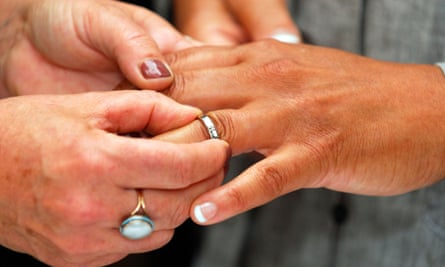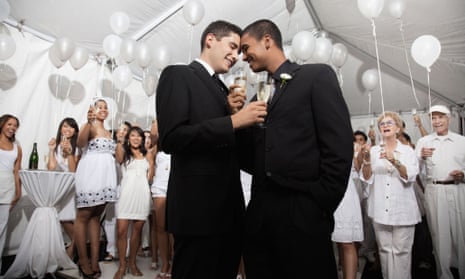Today I got out of my gay bed, kissed my gay boyfriend goodbye, went to the gym with my gay neighbour and then cycled my gay bike to my gay job.
Yes, a strange sentence, but to my ear the phrase “gay marriage” sounds just as peculiar. The qualifying prefix is superfluous in every case. Yet “gay marriage” remains acceptable in the house style of many media outlets (including the Guardian). It may not be offensive, but it doesn’t quite sit right. The Australian national broadcaster, the ABC, opts for “same-sex marriage” in its neutral reporting, the adjective being less loaded than “gay”, which has been hijacked by youth slang to mean anything inadequate or inferior.
Many (myself included) would much prefer the phrases “marriage equality” or “equal marriage”. Some, such as this Christian website, are unlikely to be persuaded: “The term ‘marriage equality’ is an attempt to reframe the conversation and ascribe a certain level of irrationality to those who oppose same-sex marriage … However, attaching a new label to the cause does not change the core issues in the debate. If ‘marriage equality’ means ‘gay marriage,’ Christians should be opposed to it.” But even the Daily Mail now talks about “marriage equality”.
“Sexual preference” is in my view just as eccentric a term as “gay marriage”. Again, it’s freely adopted by many media organisations, including the Press Association and the Guardian in this 2015 report.
If you believe, as all the available science indicates, that being gay is attributed to nature and not nurture, that it’s genetic and not a choice, then this term is a misuse. My preference is for mocha over latte, mashed potato rather than boiled, Madonna rather than Kylie. My sexual orientation is not a casual preference or a choice, like choosing between pizza and pasta. I don’t merely prefer men to women. It’s something innate.
Some gay people find it offensive when it’s suggested that their sexual orientation is a choice; it trivialises the discrimination they’ve had to overcome by suggesting that they have just been obstinate and could always have chosen an easier path. It can also give ammunition to the traditional enemies of equality who will argue that any measures to accommodate someone’s picky preference are not high priority.

“Sexual orientation” as an expression is clearer and less likely to lead to misunderstanding, acknowledging that you are born with an inner compass that points in a certain direction on the Kinsey scale.
Even if you do believe nurture plays a part in sexual orientation, the term sexual preference could still be a misnomer. Some parts of our character are so deeply ingrained from the nurture of our early childhood that we have little conscious choice over how they manifest as adults. When deconstructed, the term “preference” relating to sexuality seems, quite frankly, odd.
Gary Nunn is a regular contributor to Mind your language. His posts appear on the last Friday of every month. @GaryNunn1

